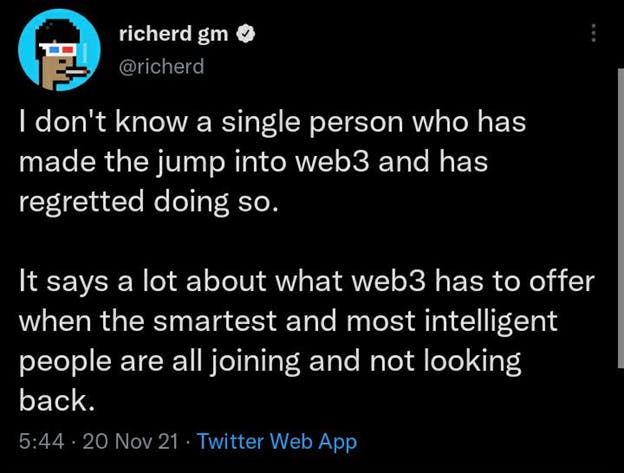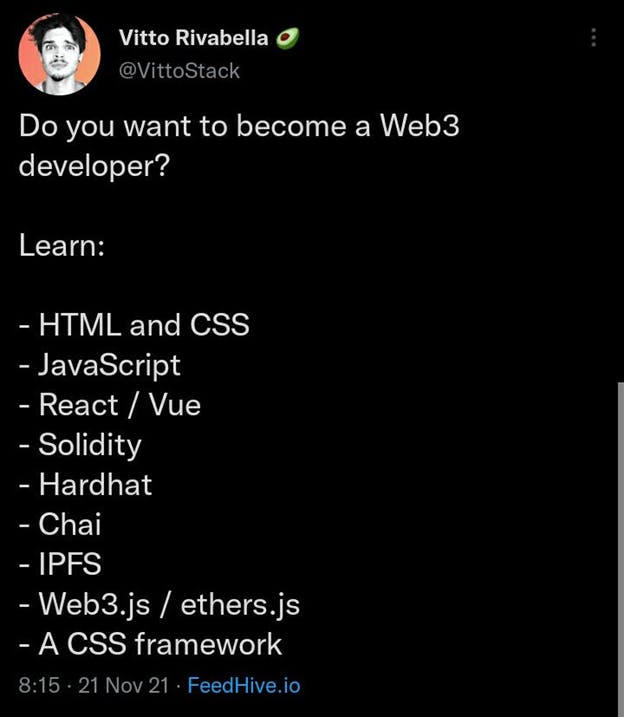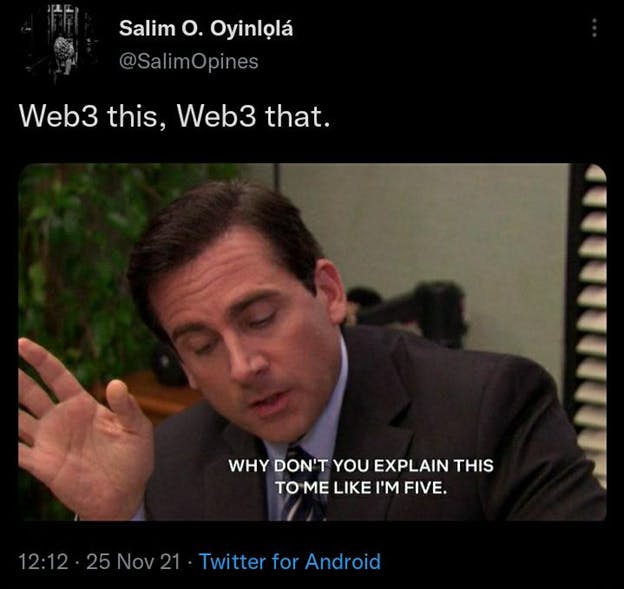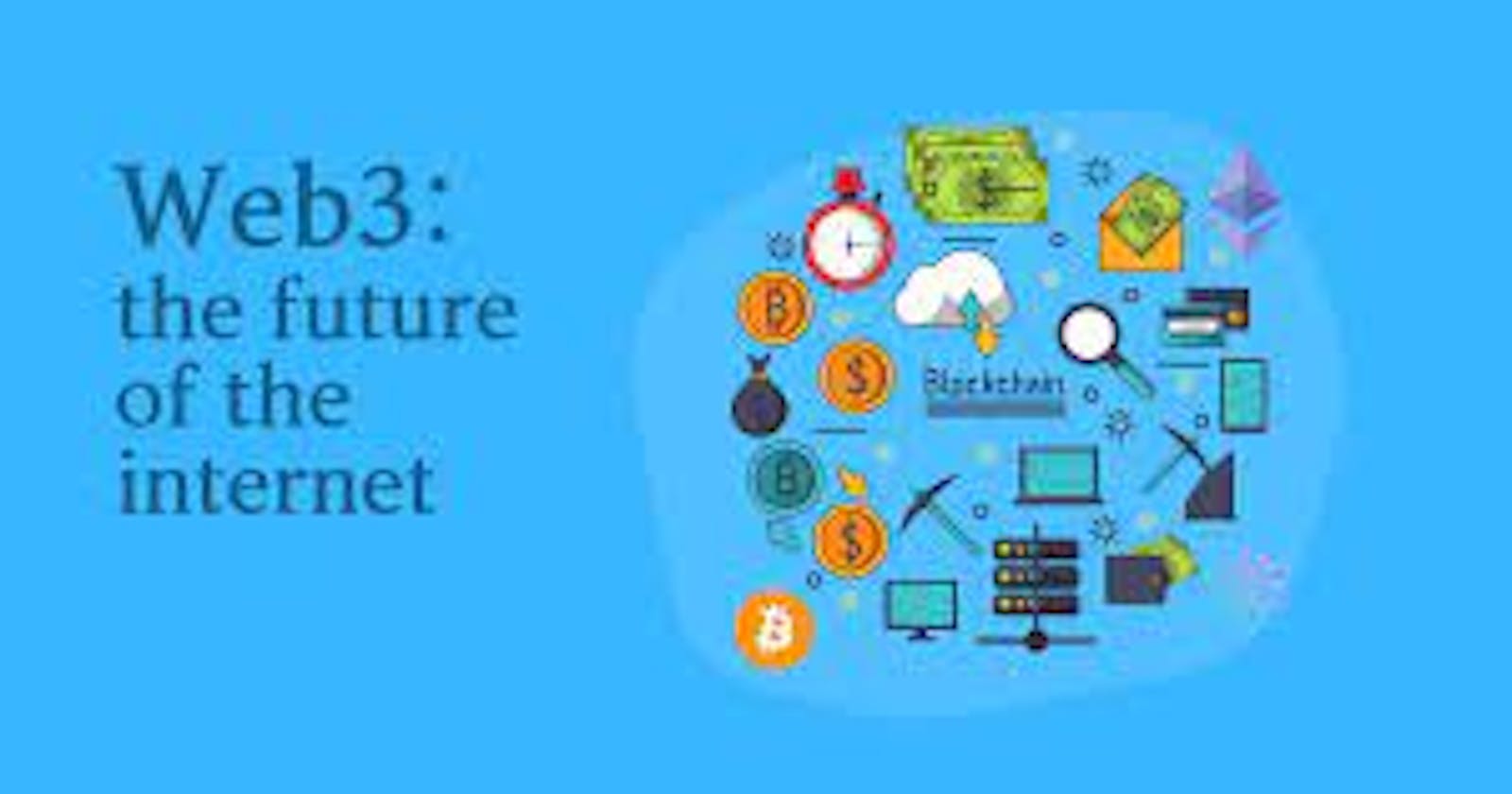Scrolling through Tech twitter could be very stressful. Often times, one could end up confused. Seeing a handful of people doing so well, getting gigs and celebrating dubs might take its toll on one’s mental health. With imposter syndrome also doing its bits, the last thing you want to be is clueless. Tech Twitter’s most recent obsession is Web3. One can hardly go through five tweets from the ‘Tech Today’ twitter list without coming across a tweet that relates to Web3.



By the end of this article, readers would know what Web3 is, how cryptocurrency ideas tie into the evolution of our current internet and what it means for you as a user.

There is no internet encyclopedia verified by some ‘institute of global technology’ that has a strict or official definition of what Web3 is. As such, the true meaning of Web3 is very dynamic. However, by the end of this article, readers would have a brief yet in-depth knowledge of what Web3 is. Before we delve into that, I believe it is paramount that readers understand what Web1 and Web2 is respectively.
In simple layman’s terms, Web1 would be somewhat like the initial overview of what the internet was between 1991 and 2004. You know, a bunch of static pages. The more appropriate description of these pages would be read-only in that whenever you loaded them, they showed some stuff and that was it. There was no logging in, interacting with posts or viewing analytics. Most webpages were not even profitable by ads. Almost like one big Wikipedia all hyperlinked together. Although by the end of this era, the introduction of JavaScript helped add more features, during this period, users of the internet were simple just consumers. You went to the internet to consume information and that was it.
That takes us to Web2, which has been around from 2004 to right about now. The major evolution with the emergence of Web2 was the interactivity of the internet. Not only did users get information from the internet, but the webpages also started taking information from us. As we viewed Twitter, Facebook and the rest, these companies were able to collect data about us so that they can serve us better content and make users stay on their website longer. The Web2 is the age of targeted advertising and the lack of privacy for the users.
Next up is Web3 and this is why you are reading this article. It is the next evolution of the internet that uses block chain technologies and the tools of decentralization. Although a large chuck of its workings remains unclear, the general belief is that unlike Web2 where the users of the internet were the products, with web3, users will be the owners of their content. The experts say users will have full control of their data in Web3.
In simpler terms, this would mean that your posts couldn’t get taken down by say YouTube because your posts wouldn’t be on one of YouTube’s servers, it will theoretically be on thousands of computers around the world. This ensures that whatever block chain social network the user is on is not attacked or censored. I'd bet that what you are thinking right now are the risks with that – the risk of the quick circulation of illegal or hateful things being posted in the name of freedom.
In Web3, experts predict that we would reach a point where every company is ran by a decentralized group called a DAOs which stands for Decentralized Autonomous Organizations. The true meaning of DAOs and what it does comes with a lot of technicality but what it means in layman’s term is that there will be no presidents or CEOs to impress. Users with the most tokens get to vote on how the company changes without being limited by the government. Furthermore, in Web3, there would be no censorship like we have on twitter right now – one controlling authority cannot shut it down.
On a final note, the biggest change Web3 comes with is that users’ digital identity will not be 100% connected to their real-world identity. This implies that Salim Oyinlola for instance, can view pages, download things, make purchases and any other activity on the internet without being traced to the real me.
If at this point, the long-term implication of Web3 remains unclear, this is for you. The reality of Web3 is that in the next decade, Salim might be able to buy amazon gift cards using Meta masks and pay with Ethereum or he might be able to anonymously leave a like on one of his friend’s posts using one of his hidden wallets. Personally, I don’t expect that it would a bunch of life-changing turnaround all at once. Web3 would likely be a series of ideas that grow together until centralized companies like Facebook and Google are disassembled by legislature or unregulated DAOs grow to replace them.
